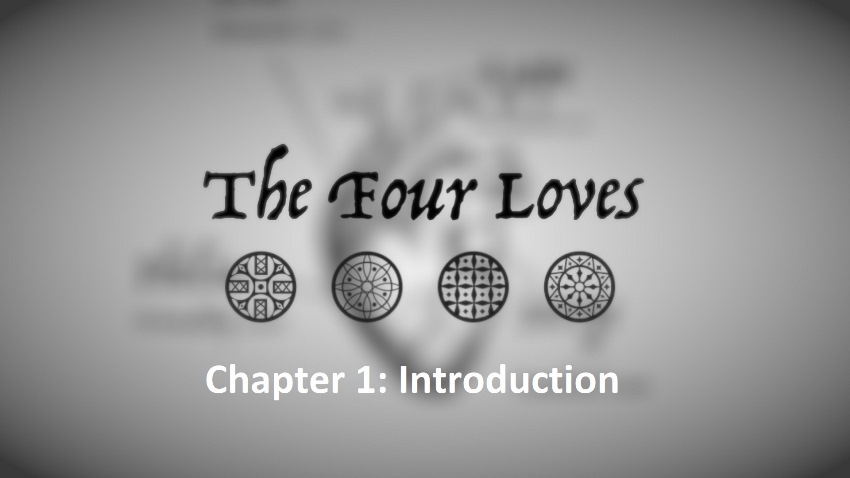Friday Frivolity: Stuff Catholic Guys Say and Do

"We are travellers…not yet in our native land" – St. Augustine



Our San Diego C.S. Lewis Reading Group will starting a new book this week, The Four Loves.
Once again I will be providing an outline of the arguments presented in each chapter, together with quotations and explanatory notes. The chapters in this book are generally a good bit longer than our previous book (Mere Christianity), so I may well experiment with the format of these posts as I work through each chapter.
1. Lewis thought that St. John’s statement that “God is love” would provide a clear plan for this book
“‘God is love,’ says St. John. When I first tried to write this book I thought
that his maxim would provide me with a very plain highroad through the
whole subject. I thought I should be able to say that human loves deserved
to be called loves at all just in so far as they resembled that Love which is
God”
2. He therefore divided love into two types:
(a) Gift-love
“The typical example of Gift-love would be that love which moves a man to work and plan and save for the future well-being of his family which he will die without sharing or seeing”
(b) Need-love
“…that which sends a lonely or frightened child to its mother’s arms”
3. These types of love reflect both divinity and humanity
(a) Divine Love
“Divine Love is Gift-love. The Father gives all He is and has to the Son. The Son gives Himself back to the Father and gives Himself to the world, and for the world to the Father, and thus gives the world (in Himself) back to the Father too”
(b) Relation to God
“…what…can be less like anything we believe of God’s life than Need-love? He lacks nothing… We are born helpless. As soon as we are fully conscious we discover loneliness. We need others physically, emotionally, intellectually; we need them if we are to know anything, even ourselves”
3. Lewis thought he could just praise Gift-love and disparage Need-love
“I was looking forward to writing some fairly easy panegyrics on the first
sort of love and disparagements of the second… But I would not now deny the name love to Need-love… The reality is more complicated than I supposed”
In this section, Jack uses the term “panegyrics” which refers to a speech in which something is praised. He also refers to his “master, MacDonald” was an author and minister he greatly admired, George MacDonald.

I have walked too long with death’s chill in the air,
mourned over trees too long with branches bare…
I am saying to Love who wakens love:
rise in the south and come!
Hurry me into the springtime; hustle the winter out of my sight…
…then plunge me into the leafing and my blossoming
– Jessica Powers
 Well, this is beautiful…
Well, this is beautiful…
 We haven’t had any classical music here on Music Monday’s in quite some time! In an effort to correct that, here is Piano Concerto No. 3 from Rachmaninov, performed by Russian pianist Olga Kern:
We haven’t had any classical music here on Music Monday’s in quite some time! In an effort to correct that, here is Piano Concerto No. 3 from Rachmaninov, performed by Russian pianist Olga Kern:


We finally come to the last chapter of Book I of “Mere Christianity”! The chapter bears the ominous title “We have cause to be uneasy”. Thus far, C.S. Lewis has demonstrated that there is a Moral Law which we did not create and that we violate this Law continually. Now Jack explains why this should give us cause for concern…
If you enjoy this episode, you can subscribe manually, or through a service like iTunes, Google Play or Podbean. As always, if you have any objections, comments or questions, please send us an email through my website or tweet us @pintswithjack.
Episode 7: “We have cause to be uneasy” (Download)
Audio Player

Nessa and I could not meet up this week, so I recorded a solo where I talked about meeting Christ in my Father’s death.
Please subscribe to this podcast using iTunes, Google Play or Podbean. If you have any feedback or would like to pose a question for an upcoming episode, you can send us a message from the website or tweet us at @davidandnessa.
Episode 12: Memento Mori (Download)
Audio Player
— Show Notes —
* “Memento Mori” is a phrase in Latin which means “Remember Death”
* If you were wondering where Whidbey Island is, it’s here.
* The book I referenced was “Something Other Than God” by Jennifer Fulwiler:
“The Catechism explained that praying for the souls of the dead is a tradition going back to the first Christians and to the Jews before them… The living sent their love for the deceased into the spiritual world, like adding water to a stream that would eventually float their lost friends home“
* Don’t believe me about the ninja boots? Here they are.
* The Psalm I quoted was Psalm 84:6
Blessed are the men whose strength is in [the Lord]… As they go through the Valley of Baca [weeping] they make it a place of springs; the early rain also covers it with pools.
* The poem I quoted at the end was “As Kingfishers Catch Fire” by Gerard Manly Hopkins:
…for Christ plays in ten thousand places,
Lovely in limbs, and lovely in eyes not His
To the Father through the features of men’s faces.
* A written version of what I said in this podcast is available on my blog.